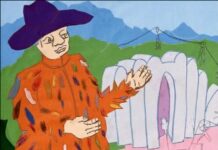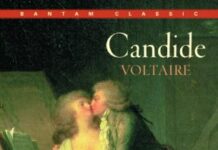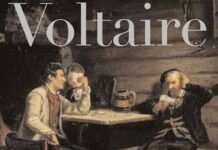
Ebook Info
- Published: 2007
- Number of pages: 160 pages
- Format: PDF
- File Size: 0.89 MB
- Authors: Voltaire
Description
In his Philosophical Letters, Voltaire provides a pungent and often satirical assessment of the religion, politics, science, and arts of the England he observed during his nearly three-year exile. In addition to the Letters, this edition provides a translation of Voltaire’s Proposal for a Letter about the English, a general Introduction, chronology, notes, and bibliography.
User’s Reviews
Reviews from Amazon users which were colected at the time this book was published on the website:
⭐A very strong study. It took weeks to read it all.
⭐it was rental
⭐François-Marie Arouet (1694-1778; known by his nom de plume Voltaire) was a French Enlightenment writer, historian and philosopher famous for his wit, his attacks on the established Catholic Church, and his advocacy of freedom of religion, freedom of expression, and separation of church and state. He was perhaps the most influential writer of his times. This book was originally published as “Letters Concerning the English Nation”; in 1734 it was condemned by the Parliament of Paris, and ordered to be burned. Voltaire writes as an Englishman writing home to a fellow Frenchman.He notes, “This is the country of sects. An Englishman, as a free man, goes to Heaven by whatever road he pleases. Yet, though everyone here may serve God in his own fashion, their genuine Religion, the one in which people make their fortune, is the sect of the Episcopalians, called the Church of England… No one can hold office in England or Ireland unless he is a faithful Anglican. This argument… has converted so many nonconformists that today not a twentieth of the population lives outside the lap of the established Church.” (Pg. 22) He adds, “Clergymen go to the tavern sometimes, or custom allows it; if they get drunk they do so in a serious-minded way and with perfect propriety.” (Pg. 24)He observes, “Go into the Exchange in London… and you will see representatives of all the nations assembled there for the profit of mankind. There the Jew, the Mahometan, and the Christian deal with one another as if they were of the same religion, and reserve the name of infidel for those who go bankrupt. There the Presbyterian trusts the Anabaptist, and the Church of England man accepts the promise of the Quaker. On leaving the peaceable and free assemblies, some go to the synagogue, others in search of a drink; this man is on the way to be baptized in a great tub in the name of the Father, by the Son, to the Holy Ghost; that man is having the foreskin of his son cut off, and a Hebraic formula mumbled over the child that he himself can make nothing of; these others are going to their church to await the inspiration of God with their hats on; and all are satisfied. If there were only one religion in England, there would be danger of tyranny; if there were two, they would cut each other’s throats; but there are thirty, and they live happily together in peace.” (Pg. 26)He points out, “It appears to me almost certain that animals cannot be mere machines. Here is my proof: God made them for precisely the same sense organs as our own, and so it they do not feel, God has made a useless work. Now even you acknowledge that God does nothing in vain, and so He has not manufactured all those organs of feeling in order that no feeling should be done with them, and therefore animals are not mere machines.” (Pg. 57)He states, “we should never fear that any philosophical opinion could harm the religion of a country… Never will philosophers set up a religious sect. Why? Because they do not write for the people, and because they are without enthusiasm. Divide the human race into twenty parts. Nineteen of them are composed of those who work with their hands, and will never know if there is a Locke in the world or not. In the remaining twentieth part how few men do we find we read! And among those who do read there are twenty who read novels for every one who studies philosophy. The number of those who think is exceedingly small, and they are not aiming to disturb the world.” (Pg. 58)He comments on Pascal’s
⭐, “I have a stake, no doubt, in the existence of a God; but if, in your system, God has only come for so few persons; if the smallness of the number of the elect is so frightening; if I can do nothing at all by myself, tell me, if you please, what I have to gain in believing you. Have I not an obvious interest in being persuaded to the contrary? How can you have the effrontery to show me a limitless happiness, to which, out of a million men, hardly one has the right to aspire? If you want to convince me, set about it in another way, and don’t go telling me about games of chance, about bets, about heads and tails…” (Ph. 123)Voltaire’s letters are still as witty as when he wrote them, and his philosophical observations are just as pertinent.
⭐François-Marie Arouet (1694-1778; known by his nom de plume Voltaire) was a French Enlightenment writer, historian and philosopher famous for his wit, his attacks on the established Catholic Church, and his advocacy of freedom of religion, freedom of expression, and separation of church and state. He was perhaps the most influential writer of his times. This book was originally published as “Letters Concerning the English Nation”; in 1734 it was condemned by the Parliament of Paris, and ordered to be burned. Voltaire writes as an Englishman writing home to a fellow Frenchman. [NOTE: page numbers below refer to teh 150-page paperback edition.]He notes, “This is the country of sects. An Englishman, as a free man, goes to Heaven by whatever road he pleases. Yet, though everyone here may serve God in his own fashion, their genuine Religion, the one in which people make their fortune, is the sect of the Episcopalians, called the Church of England… No one can hold office in England or Ireland unless he is a faithful Anglican. This argument… has converted so many nonconformists that today not a twentieth of the population lives outside the lap of the established Church.” (Pg. 22) He adds, “Clergymen go to the tavern sometimes, or custom allows it; if they get drunk they do so in a serious-minded way and with perfect propriety.” (Pg. 24)He observes, “Go into the Exchange in London… and you will see representatives of all the nations assembled there for the profit of mankind. There the Jew, the Mahometan, and the Christian deal with one another as if they were of the same religion, and reserve the name of infidel for those who go bankrupt. There the Presbyterian trusts the Anabaptist, and the Church of England man accepts the promise of the Quaker. On leaving the peaceable and free assemblies, some go to the synagogue, others in search of a drink; this man is on the way to be baptized in a great tub in the name of the Father, by the Son, to the Holy Ghost; that man is having the foreskin of his son cut off, and a Hebraic formula mumbled over the child that he himself can make nothing of; these others are going to their church to await the inspiration of God with their hats on; and all are satisfied. If there were only one religion in England, there would be danger of tyranny; if there were two, they would cut each other’s throats; but there are thirty, and they live happily together in peace.” (Pg. 26)He points out, “It appears to me almost certain that animals cannot be mere machines. Here is my proof: God made them for precisely the same sense organs as our own, and so it they do not feel, God has made a useless work. Now even you acknowledge that God does nothing in vain, and so He has not manufactured all those organs of feeling in order that no feeling should be done with them, and therefore animals are not mere machines.” (Pg. 57)He states, “we should never fear that any philosophical opinion could harm the religion of a country… Never will philosophers set up a religious sect. Why? Because they do not write for the people, and because they are without enthusiasm. Divide the human race into twenty parts. Nineteen of them are composed of those who work with their hands, and will never know if there is a Locke in the world or not. In the remaining twentieth part how few men do we find we read! And among those who do read there are twenty who read novels for every one who studies philosophy. The number of those who think is exceedingly small, and they are not aiming to disturb the world.” (Pg. 58)He comments on Pascal’s
⭐, “I have a stake, no doubt, in the existence of a God; but if, in your system, God has only come for so few persons; if the smallness of the number of the elect is so frightening; if I can do nothing at all by myself, tell me, if you please, what I have to gain in believing you. Have I not an obvious interest in being persuaded to the contrary? How can you have the effrontery to show me a limitless happiness, to which, out of a million men, hardly one has the right to aspire? If you want to convince me, set about it in another way, and don’t go telling me about games of chance, about bets, about heads and tails…” (Ph. 123)Voltaire’s letters are still as witty as when he wrote them, and his philosophical observations are just as pertinent.
⭐If you get this at a low enough price, you won’t be disappointed: this is a sort of “meeting minimum expectations” effort, neither informative for a non-specialist, nor impressive for a specialist. The publisher should have chosen someone else to write an introduction (or the notes, throughout)… someone who finds the politics of the era (and the political consequences of this particular book) sincerely interesting. The layout and format of the text is poor: the endnotes should instead be footnotes, and when you do bother to hunt these endnotes down, you’ll be disappointed that you’re provided with very little historical context (for the obscure characters and situations alluded to), so you’ll end up googling it anyway. It’s not a good version of Voltaire’s text, but it’s in English, and it exists. If it’s cheap enough, you probably won’t complain… much… but this is “bare minimum” quality, as a book.
Keywords
Free Download Voltaire: Philosophical Letters: Or, Letters Regarding the English Nation (Hackett Classics) in PDF format
Voltaire: Philosophical Letters: Or, Letters Regarding the English Nation (Hackett Classics) PDF Free Download
Download Voltaire: Philosophical Letters: Or, Letters Regarding the English Nation (Hackett Classics) 2007 PDF Free
Voltaire: Philosophical Letters: Or, Letters Regarding the English Nation (Hackett Classics) 2007 PDF Free Download
Download Voltaire: Philosophical Letters: Or, Letters Regarding the English Nation (Hackett Classics) PDF
Free Download Ebook Voltaire: Philosophical Letters: Or, Letters Regarding the English Nation (Hackett Classics)




